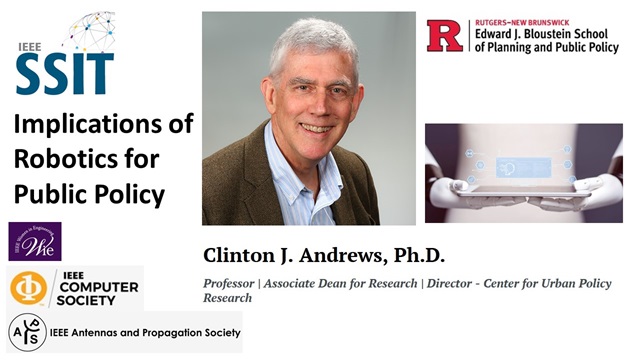IEEE SSIT Lecture: Prof Clint Andrews - Implications of Robotics for Public Policy

IEEE UK and Ireland SSIT Chapter and SSIT IST-Africa SIGHT are cooperating with a number of IEEE OUs including: North Jersey Section SSIT Chapter; Northern Virginia/Baltimore/Washington SSIT Chapter; Bahrain Section SSIT Chapter; Vancouver Section Jt. Chapter,TEM14/PC26/E25/SIT30; New Jersey Coast Section SIGHT; New Jersey Coast Section Jt. IM/Computer Society Chapter; Southeastern Michigan Section Computer Chapter; North Jersey Section: TEMS Chapter, Computer Chapter, Jt APS/MTT Chapter, WIE AG and SIGHT and UK and Ireland Computer Society Chapter to organise this SSIT Lecture as a joint Webinar on 15 May ‘24.
Registration
IEEE and SSIT Members as well as non-IEEE Members are invited to Register and participate.
IEEE Members should include their IEEE Membership Number when registering.
Access to online Meeting
Registered participants will be provided with the link prior to the event.
Guest Lecture Focus
Innovations in robotics are now present in many aspects of human endeavour, from robotic vacuum cleaners to autonomous battlefield drone swarms. Alongside the intended effects of these innovations are some emerging, unintended adverse consequences. Legal and political processes exist in part to prevent and mitigate such harms. This presentation offers a systematic analysis of the emerging routes by which applications of embodied artificial intelligence—robotics—elicit public policy responses. It develops a typology that classifies robotics applications according to how they interact with individual humans, large-scale human populations, and specific physical settings; and whether the robots operate alone, in swarms, or in integrated cyberenvironments. Each case interacts with public policymaking processes in different ways, spanning tort liability law, regulatory codes and standards, and policies for assessing and managing risk. Clear roles emerge for voluntary standards, international collaboration among governance bodies, professionals cross-trained in robotics and public policy, and institutions that effectively anticipate emerging problems.
Date and Time
Location
Hosts
Registration
-
 Add Event to Calendar
Add Event to Calendar
Loading virtual attendance info...
Speakers
Prof. Clinton Andrews
Biography:
Clinton J. Andrews directs the Center for Urban Policy Research and is a professor and the associate dean for research at the Edward J. Bloustein School of Planning and Public Policy, Rutgers University, USA. He was educated at Brown University and MIT in engineering and planning, and he worked previously in the private sector and at Princeton University. He performs research on how people use the built environment. His work addresses climate change mitigation and adaptation, and how technological changes affect urban life. His books include Humble Analysis: The Practice of Joint Fact-finding, Regulating Regional Power Systems, and Industrial Ecology and Global Change. He is a past president of the IEEE Society on Social Implications of Technology.
Agenda
18:00 (UTC+1) / 13:00 (EDT) Welcome and Introduction to Guest Speaker
18:05 Lecture
18:45 Questions and Discussions

